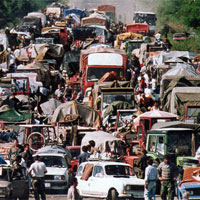On the occasion of 21 years since Operation “Storm”: Serbia to demonstrate care for victims through actions

The 4th and 5th of August 2016 mark the 21st anniversary of Operation “Storm”, which will be commemorated this year in both Croatia and Serbia with state-sponsored events: in Croatia with a victory celebration and gratitude to its veterans, and in Serbia with a church service for the victims. Despite the declared commitments to victims of the “Storm” by Serbian state leadership ahead of each anniversary, these victims in Serbia have now remained completely deprived of their rights. The Humanitarian Law Center (HLC) uses this opportunity to call upon competent institutions to comprehensively resolve the issues of compensation and support to their citizens who have suffered, as civilians, grave violations of their basic rights during the armed conflicts of the 1990s.
“Storm” was a military-police operation by the Croatian armed forces that in 1995 brought the four-year conflict in Croatia to an end. During and after the operation, widespread and systematic crimes against Serb civilians and their property took place. The operation led to the displacement of around 200,000 Serbs, most of whom were forced to leave Croatia permanently, while several hundred persons were killed. According to the Serbian Commissariat for Refugees and Migration statistics of June this year, 20,334 persons in Serbia are still registered as refugees from Croatia. The number of Serb refugees from Croatia decreased over time because some of them have returned to Croatia and many acquired Serbian citizenship in the meantime, as a result of which they formally lost refugee status. Also, according to the same statistics of June 2016, a number of refugees and exiled persons are still accommodated in 17 collective centres across Serbia.
The HLC underlines that none of the victims of the “Storm” living in Serbia today enjoy the status of a civilian victim of war. The reason lies in the fact that the competent state authorities do not recognize as victims of war persons who have suffered violence outside the territory of the Republic of Serbia, although this is not explicitly prescribed by the law on civilian victims of war. Still, some of the victims from “Storm” or their family members have succeeded in obtaining the rights set out in this law since its adoption in 1996, but had those rights subsequently revoked when the practice was abruptly reversed in 2013. It was at that time, namely, that the HLC filed requests for recognition of civilian victim status on behalf of other non-Serb victims from Sjeverin. Instead of approving the requests, the competent Ministry of Labour and Social Policy took the stand that the law does not apply to cases where the death or injury has occurred on the territory of other former Yugoslav republics, and used this interpretation to not only deny the requests of the Sjeverin victims, but also to quash all previous decisions according the rights to victims from Croatia and BiH. In February this year, the Ministry informed the HLC that by the end of 2015 it had launched 14 procedures for the annulment of such decisions and that 13 people had already been stripped of the rights they had previously acquired.
Despite long-standing and continuing criticism of the current legal framework and the absence of compensation for civilian victims of war coming from the relevant UN committees (Human Rights Committee, Committee against Torture and Committee on Enforced Disappearances), highest officials of the Council of Europe as well as EU institutions (contained in European Commission’s 2014 and 2015 progress reports on Serbia and in the accompanying European Parliament Resolution of February this year), and despite recommendations and attempts by the civil society to improve the law, the competent Ministry has decided to continue pursuing the same policy with regard to civilian victims of the recent armed conflicts. Namely, the Draft Law on the Rights of Veterans, Disabled Veterans, Civilian Invalids of War and Their Families, which was drawn up and put for public debate in December 2014, maintains exactly the same regime with regard to civilian victims of war and their families as the law currently in effect, that very same regime that completely excludes the majority of victims living in Serbia. Moreover, Article 18 of the Draft Law now explicitly prescribes that an injury must have occurred on the territory of the Republic of Serbia, and Article 146 states that the applications lodged by persons who have sustained injuries outside Serbian territory will not be processed at all. In case these provisions get adopted, victims of the “Storm” living in Serbia today would remain outside the scope of the law and would remain stripped of any rights.
The opening of Chapter 23 (relating to the judiciary and fundamental rights) within EU accession talks imposes an obligation on Serbia to adopt a completely different approach to this issue, respecting its international commitments emanating from the relevant international treaties that Serbia has ratified, as well as the fundamental human rights values of the European Union, in particular the human rights of those who are most vulnerable. The common EU negotiating position for this Chapter states that Serbia should improve its victim support system and ensure victims’ rights and access to justice without discrimination. The pace of accession negotiations and also their final outcome will be dependent on Serbia’s ability to make substantial progress in this area. Further, Serbia is expected to recognise and use the benefits of civil society expertise and engage in a real and systematic dialogue with civil society. The HLC, together with the Centre for Advanced Legal Studies, has already come up with one such solution, which is based on well-established international human rights standards and was published it in the form of a Model Law.
Search for Missing Persons
According to data obtained from the Commission on Missing Persons (p. 67) in May this year, the search continues for at least 373 Serbian citizens and 728 Croatian citizens of Serbian ethnicity who are still missing in connection with the conflict in Croatia. The cooperation between the competent Serbian and Croatian commissions was set up as far back as 1995, but has been seen as slow and failing to bring any visible progress over the past years. In the dispute before the International Court of Justice between Croatia and Serbia, both states agreed that not enough has been done in mutual cooperation regarding search for missing persons and promised to do more in the future. In its judgment from February 2015, the Court encouraged both sides to continue cooperating in good faith and use all available means to resolve the fate of missing persons as soon as possible.
When considering the report of Serbia on the implementation of the International Convention on Protection of All Persons from Enforced Disappearances, the Committee on Enforced Disappearances was informed by Serbian delegation that Serbia provided psycho-social and financial support to 789 families of missing persons who live in Serbia and that as much as €13 million is allocated annually to their needs. When the HLC inquired what exactly this sum refers to, the competent authorities (Commission on Missing Persons and Ministry of Labour) replied that this was “a presumptive amount”. In other words, it was obviously a statement meant to create an appearance of fulfilment of international commitments, while at the same time rights of victims are not being guaranteed.
Forced Mobilisation of Refugees from Croatia
The HLC notes that the state of Serbia has not provided apology nor adequate compensation to a large number of citizens, then refugees from Croatia, who were in 1995 detained by the Serbian Ministry of the Interior (MUP) and then handed over to military authorities of the then Republika Srpska Krajina (RSK) or to the paramilitary units of the “Serbian Volunteer Guard” led by Željko Ražnatović Arkan, and afterwards they were usually sent to fight on the front lines. This forced mobilisation, which constituted the gravest possible violation of the UN Convention Relating to the Status of Refugees, in many cases resulted in the loss of life or serious physical injuries and psychological consequences for the mobilised men. In later court proceedings for compensation, nearly 800 individuals and family members of those killed managed to obtain compensation from the state, albeit inadequate. For example, for the killing of a closest relative, families were paid around €2.000 in compensation. The Supreme Court of Serbia in 2001 adopted a legal standing that the state of Serbia is responsible for “actions of the MUP, which was effectively operating together with police and military authorities […] of the Republika Srpska Krajina” (p. 31).







